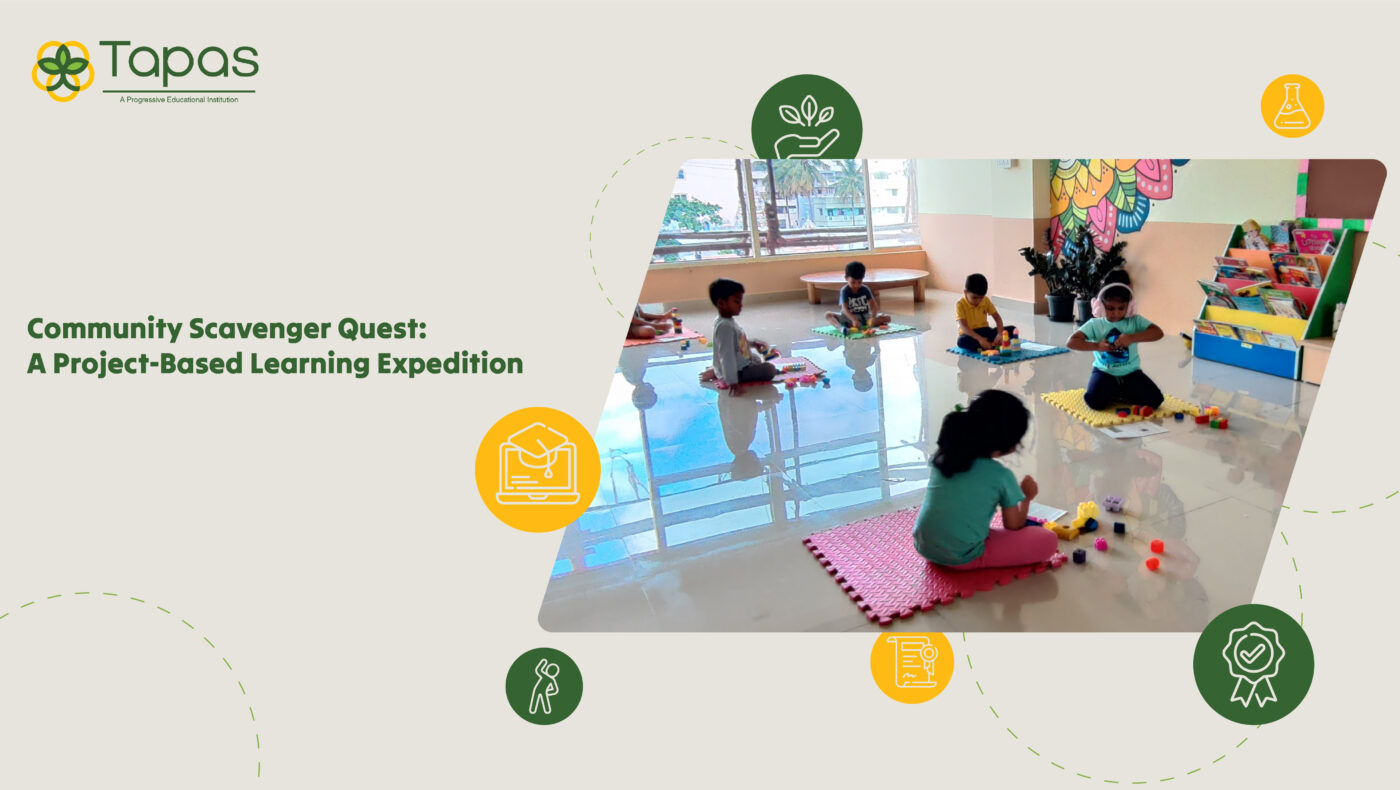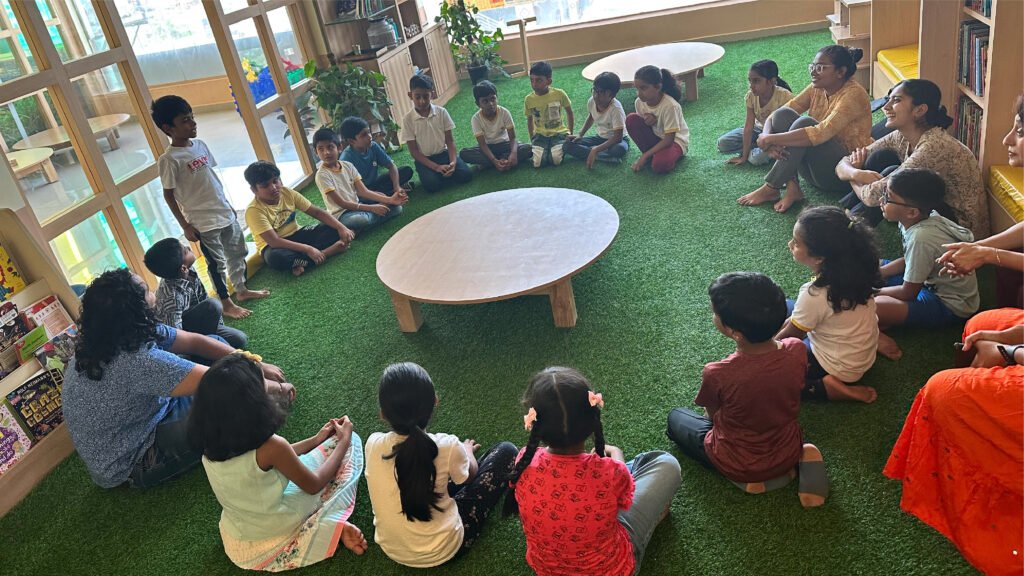Embarking on an “Educational Expedition Quest” transforms the traditional scavenger hunt into an enriching learning journey for preschoolers. This innovative approach to early childhood education merges exploration with hands-on experiences, offering our youngest learners the chance to discover and engage with their immediate surroundings. As they hunt for items or observe local landmarks, these little explorers not only satiate their natural curiosity but also develop critical thinking and observational skills in a playful, interactive setting.
On the 22nd of November, 2023, a group of enthusiastic 2 to 4-year-olds embarked on a ‘Project-Based Learning Expedition’ in their local neighbourhood. This expedition, set near their school, was not just a walk but a journey of discovery, allowing the children to interact directly with their community environment.
The initiative focuses on crafting a miniature, three-dimensional model depicting their local area, intended for display at the Varshikotsava festival. To construct this model with accuracy and richness, a journey was undertaken to delve deeper into the various components that constitute a neighbourhood. This included scrutinizing architectural structures, pathways, indigenous plants and animals, communal zones, and the everyday activities of residents. This exploration aimed to collect detailed observations and ideas, thereby enabling the creation of a realistic and comprehensive diorama that truly embodies the spirit and essence of the neighbourhood.
The primary objective of our ‘Learning Quest Adventures’ was to allow the children to explore their neighbourhood in a fun, engaging manner. This adventure was designed to ignite their curiosity about the world around them, encouraging them to observe, inquire, and learn. From recognizing local landmarks to understanding community roles, each step was an opportunity for discovery. This approach ensures that learning goes beyond traditional classroom walls, making it a dynamic and interactive experience for our young learners.
Preparation and Safety Measures
Organizing the walk required meticulous planning, turning it into a ‘Collaborative Learning Journey’ for both educators and children. We mapped out a safe, child-friendly route, ensured appropriate adult supervision, and identified key local landmarks and businesses to visit. This preparation was essential to create an educational and enjoyable experience for the young explorers.
During our ‘Educational Expedition Quest’, the safety of our 2 to 4-year-olds was paramount. We maintained a high adult-to-child ratio to ensure constant supervision. All participants wore visible, identifiable clothing for easy recognition. The route was pre-walked by staff to identify any potential hazards. Emergency contact information was carried by all supervisors, and a first-aid kit was readily available. Additionally, before the walk, children were briefed on basic safety rules, ensuring a secure and enjoyable learning experience.
In our ‘Project-Based Learning Expedition’, emphasizing road safety rules was crucial. Teaching young children these rules not only keeps them safe during such activities but also instils essential lifelong habits. Understanding pedestrian signals, looking both ways before crossing, and the importance of staying with the group were key lessons imparted.
The Excitement of Discovery: First Stop at the Bus Stand
As the scavenger hunt began, the children’s faces lit up with sheer anticipation and excitement. Their eyes sparkled with curiosity, eagerly looking around to discover what was next. Every new sight brought a chorus of delighted gasps and cheerful chatter, embodying the pure joy of exploration and new experiences.
During our ‘Project-Based Learning Expedition’, witnessing a bus stop in action offered a valuable learning experience. The children observed the rhythm of public transport – the bus’s arrival, the opening of doors, and passengers alighting. This real-life observation helped them understand public transportation’s role in community life. Their excited reactions to the simple act of passengers disembarking highlighted how everyday occurrences can become significant teaching moments for young, inquisitive minds.
Vibrant Colors and Patriotic Feelings at the Flagpole
Upon seeing the Karnataka flag, the children’s reactions were a delightful mix of awe and pride. Their eyes widened at the sight of the vibrant red and yellow colors fluttering high above. Excitedly pointing, they chattered about its height and colors, their innocent expressions reflecting a sense of wonder and local pride.
- Fostering Local Identity: The ‘Educational Expedition Quest’ helps young children develop a sense of identity and belonging by introducing them to symbols of their local culture, like the Karnataka flag.
- Enhancing Cultural Understanding: Early exposure to cultural symbols and practices enriches children’s understanding and appreciation of their community’s heritage.
- Building Community Pride: Learning about local culture instills a sense of pride and respect for their surroundings, fostering a positive connection with their community.
- Encouraging Curiosity: Such quests pique children’s curiosity about their own culture, leading to questions and discussions that further their knowledge and interest.
- Inclusive Learning: Introducing elements of local culture makes learning inclusive and relevant, helping children see their own experiences reflected in their education.
Encounters with Nature: Dogs, Birds, and Bees
The children encountered friendly neighbourhood dogs during our ‘Learning Quest Adventures’, leading to heartwarming interactions. They learned to approach animals gently, experiencing the joy of petting and playing under careful supervision. The melody of chirping birds added a natural soundtrack to our journey, captivating the kids. They observed different birds, listened to their songs, and tried to mimic the sounds, fostering a connection with nature and teaching them the importance of being gentle and respectful to all living beings.
The children were utterly fascinated by honey bees buzzing around flower shops. Their eyes followed each bee’s dance from flower to flower, marveling at their busyness and agility. This observation sparked questions about nature, pollination, and the environment, turning a simple moment into a profound learning opportunity making our ‘Educational Expedition Quest’ a success.
Exploring Local Shops: A Glimpse into Community Business
During our neighborhood exploration, we visited a variety of local shops, each offering unique learning experiences. The children’s curiosity was piqued as they toured through vibrant vegetable and fruit shops, colorful garment stores, and the bustling aisles of a supermarket. These visits provided a practical glimpse into everyday commerce and community life.
Incorporating local businesses into our ‘Project-Based Learning Expedition’ is vital for several reasons. Firstly, it helps children understand the concept of commerce and its role in daily life. They learn where the food they eat comes from, how clothes are sold, and the workings of a supermarket. Secondly, it fosters community connections, showing children that businesses are run by people who are part of their community. This can build a sense of belonging and responsibility. Lastly, it introduces them to various career paths and economic concepts in a tangible way, laying a foundation for future learning and personal development.
Lessons Learned and Memories Made
Reflecting on our ‘Collaborative Learning Journey’, it’s clear the children gained a wealth of knowledge about their surroundings. They learned to identify different types of shops and their functions in the community, gaining insight into local commerce. The importance of road safety and public transport was another key takeaway, as they observed traffic lights, pedestrian crossings, and bus routines. Encounters with nature, like observing birds and bees, instilled a sense of environmental awareness and curiosity about the natural world. Most importantly, they learned the value of observation and inquiry, essential skills for understanding and interacting with the world around them.
Memorable quotes and reactions from the children
- “Ah! Ma’am look, that Aunty got down from the bus here!” – expressed with wide-eyed wonder at the bus stand.
- “See so high that red and yellow color flag is and it is waving at us” – children’s reaction to the Karnataka flag, filled with awe and excitement.
- “Ma’am tiny bees jumping from flower to flower” – a child’s observation of bees at the flower shop, reflecting their fascination with nature.
- “Why is the light red now?” – a curious question about traffic signals while learning about road safety.
- “Can we pet the dog?” – showing their eagerness to interact with friendly neighbourhood dogs.
- “These apples are so big!” – a child’s amazed reaction at the fruit shop, noticing the variety of produce.
- “Look at all these colours!” – an excited remark in the garment shop, highlighting their interest in the vibrant displays.
Conclusion: The Impact of Project-Based Learning in Early Childhood
A ‘Project-Based Learning Expedition’ offers numerous benefits for early childhood development. It enhances observational skills, as children learn to notice and interpret their surroundings. The hands-on experience promotes critical thinking and problem-solving, encouraging children to ask questions and seek answers. Social skills are developed through interaction with peers and adults in a real-world setting. Such activities also foster independence and confidence as children navigate and explore new environments. Exposure to diverse local sights and sounds broadens their understanding of the world, cultivating curiosity and a love for learning that extends beyond the classroom into everyday life.
We strongly encourage parents and educators to embark on similar ‘Collaborative Learning Journeys’ with their children. These real-world experiences are invaluable in complementing classroom education, offering hands-on learning and fostering a deeper connection with the community. Such activities enrich a child’s educational experience and strengthen the bond between children, parents, and educators through shared discovery and learning.
Thank you for joining us on this journey! If you’ve had similar experiences or thoughts on community-based learning activities, we’d love to hear from you. Share your stories in the comments below and let’s inspire each other with more ideas to enrich our children’s learning adventures. Your insights are invaluable!


